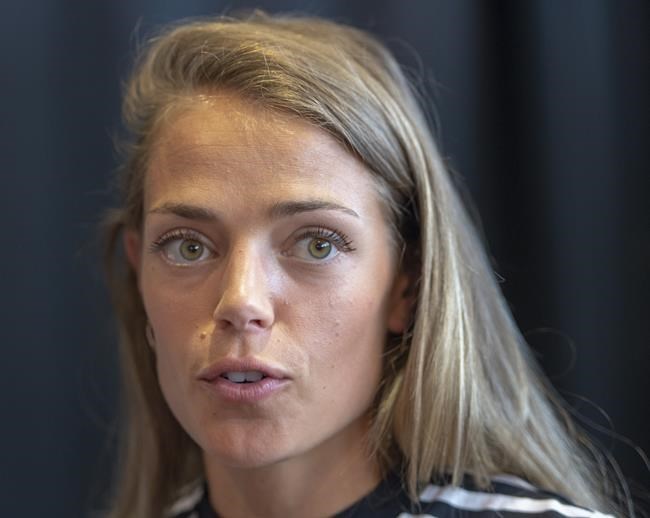Melissa Bishop-Nriagu kept every training program coach Dennis Fairall had written for her over the decade the two had worked together.
And so, when Bishop-Nriagu returned to the track after becoming a mom in 2018, and Fairall's health was deteriorating, Victoria coach and exercise physiologist Trent Stellingwerff took over coaching duties.
But it's all based on Fairall's impressive body of work.
"We kept Dennis in the loop as much as we could, and ask questions where we could, but we have a wealth of information from Dennis," Bishop-Nriagu said.
The legendary University of Windsor coach died on Nov. 6 of progressive supranuclear palsy, a rare degenerative brain disease. Fairall — or "Big Dawg" to his athletes — was 67.
Bishop-Nriagu saw Fairall, who was diagnosed in 2013, a couple of weeks before he died, "and he knew exactly who I was.
"He held my hand so tight, and his eyes got so big," she said, fighting back tears.
The 32-year-old from Eganville, Ont., is in Victoria to train with Stellingwerff, as the two make the most of an Olympic year derailed by COVID-19.
"I'm very fortunate I'm an 800 runner, I can do the majority of the work I need outside. If it's really terrible weather, I can jump on a treadmill, I don't need equipment. I don't need poles. I don't need a pit to jump into," she said.
Bishop-Nriagu and husband Osi built a gym in their basement, serendipitous that they finished it right before the global pandemic hit.
"We tried to get a stand, like a tree to hold weight plates, and you couldn't even get that (once COVID-19 hit). You couldn't get dumbbells, it was wild," she said.
One of the biggest challenges was finding tracks to train on. Bishop-Nriagu hopped a few high school fences, "which was illegal, but we never got arrested so it was fine," she laughed.
She worked with Don Garrod, who coached alongside Fairall for years.
"He was my eyes on the ground because Trent was all the way in Victoria," Bishop-Nriagu said.
Eight months out from the 2021 Tokyo Olympics, and with COVID-19 cases still climbing in North America and numerous other countries, the racing schedule remains a huge question mark.
While there are a couple of big indoor meets in the U.S. early in the new year, crossing the border is out of the question, she said, considering the federal government's travel restrictions.
"My gut feeling is that it's really going to be dependent on what's happening with COVID around the world, so I think we can plan for (races), but they need to be in pencil, they can't be set in stone yet," Bishop-Nriagu said.
"The trouble we run into is when we come back to Canada, I have to quarantine for two weeks, and that completely undoes all the work that we've been working towards. So, I don't know how we're going to manage it."
Bishop-Nriagu, the 2015 world silver medallist, took some time off after the postponement of the Olympics was announced last March.
"I felt like I was like mourning something, and what got me out of it was just moving again and exercising, it kind of brought me out of that like sluggish feeling," she said.
The middle-distance star has workout advice for anyone feeling overwhelmed by the pandemic. The key is making time for self-care.
"It's so easy to sit down and be at your desk and do so much work, and the next thing you know, it's four o'clock, and you don't have any time to work out," she said. "Carving out that time for yourself to work out, just even get outside for a walk can be really helpful."
She suggests HIIT — high-intensity interval training — workouts.
"They take like 30 minutes, you hurt so much after, but it's literally just 30 minutes out of your day, you get the blood moving, and you'll be sore, but don't be afraid to have an Advil or something to curb those muscle aches. That'll get you to the next workout. And it'll help your mental health, just being able to move."
The messaging around Canadian athletes heading to Tokyo has been about resiliency, making the best of a bad situation. But Bishop-Nriagu said, realistically, it's not that simple. In a non-COVID season, she'd be heading south in a few weeks for warm-weather training. That's off the table now.
"It is up to us how we train for this and how we handle the situation, how we choose to handle it," she said. "But on the other hand, a lot of us don't have the resources to do that. With no gyms open or no physio or no budget to be anywhere, to get that training, it can be very difficult.
"There are limitations. But I do agree that you have to make your mindset that 'Yes, I will do this whatever way I can,'" she said.
Bishop-Nriagu had her sights set on the podium at the 2016 Olympics in Rio, in a race she dedicated to Fairall and their journey. She finished fourth, and choked back tears afterward.
She'll head to Tokyo without Big Dawg, but said "Dennis will always be with me.
"Dennis taught me so much about the sport and really got me to where I am today. Any success I have from this point forward is because of Dennis," she said. "He laid the foundation.
"And I know what he would say to me, lining up on that start line. And as long as I keep that with me, I think we'll be OK. I know he's there."
This report by The Canadian Press was first published Nov. 18, 2020.
Lori Ewing, The Canadian Press



